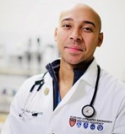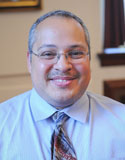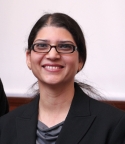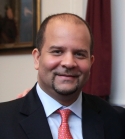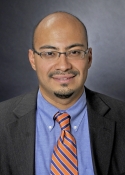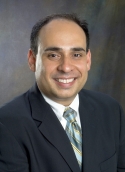Faculty
DICP Fellowship Alumni
2021-2023 DICP Faculty Fellowship Recipients
Monik Jimenez, ScD
Assistant Professor of Medicine, Harvard Medical School, Brigham and Women’s Hospital
Mentor: Kathryn M. Rexrode, MD, MPH, Associate Professor of Medicine, Harvard Medical School, Associate Physician, Brigham and Women’s Hospital
Department Chair: Joseph Loscalzo, MD, PhD, Hersey Professor of the Theory and Practice of Medicine, Harvard Medical School; Head of the Department of Medicine, Brigham and Women’s Hospital
Project Title: “Examining Stroke Symptoms as Markers of Stroke Risk among Hispanic/Latinx Adults”
Project Description: Hispanic/Latinx adults exhibit a significantly greater incidence of total stroke, younger age at stroke mortality, and worse neurologic, cognitive, and functional outcomes post-stroke than Whites. The Questionnaire for Verifying Stroke-Free Status is a novel and validated screening tool used to identify individuals at a high risk of incident stroke through the self-report of stroke symptoms (sudden onset of unilateral weakness, unilateral numbness, loss of vision, loss of half-vision, inability to understand, and inability to communicate). Endorsement of at least one stroke symptom is predictive of subsequent stroke incidence irrespective of other stroke risk factors, based on data from clinical and epidemiologic studies. However, current research has focused exclusively on non-Hispanic Black and White adults. The relationship between stroke risk factors and stroke symptoms among and between Hispanic/Latinx adults is uncertain as are appropriate interventions among those identified to be at high-risk.
This innovative project will provide actionable solutions to address inequities in stroke among Hispanic/Latinx adults by (1) assessing the association between diabetes and hypertension (severity and clinical control) and stroke symptoms and variability across heritage groups, (2) determining the clinical, socio-economic and socio-cultural factors explaining differences in stroke symptoms across heritage groups, and (3) assessing the feasibility of a culturally tailored screening intervention targeted to Hispanic/Latinx adults at high-risk of stroke. Data previously collected by the applicant on stroke symptoms from >8,000 participants of Hispanic Community Health Study/Study of Latinos will be utilized. Findings from this research will be used as preliminary data to support future R01 level applications.
Biography: Monik C. Jiménez is an Associate Epidemiologist at Brigham and Women’s Hospital and Assistant Professor of Medicine at Harvard Medical School and Harvard T.H. Chan School of Public Health. She received both her master’s and doctoral degrees from Harvard T.H. Chan School of Public Health and a Certificate in Oral Epidemiology from Harvard School of Dental Medicine. Her NIH funded work has examined the combined impact of race/ethnicity and sex in understanding the role of socioeconomic and behavioral factors in predicting, mediating and modifying inequities in stroke. She is the recipient of the Brigham and Women’s Hospital’s Minority Faculty Career Development, the H. Richard Nesson Fellowship and a Health Equity Innovation Grant to support her work in cardiovascular health equity among incarcerated people. She is an elected Fellow of the American Heart Association and is the Chair of the Mid-Career Committee of the national Council Operations Committee. She is also a committed educator at the undergraduate and graduate level, serving as Program Director for a summer research program for URM students at Brigham and Women’s Hospital and course director of “Cardiovascular Epidemiology” and “Mass Incarceration and Health in the US” at Harvard T.H. Chan School of Public Health.
Marcella F. Luercio, MD
Instructor in Pediatrics, Harvard Medical School, Boston Children’s Hospital
Mentor: Valerie Ward, MD, MPH, Assistant Professor of Radiology, Harvard Medical School; Chief Equity and Inclusion Officer, Boston Children's Hospital
Division Chief: Christopher P. Landrigan, MD, MPH, William Berenberg Professor of Pediatrics, Harvard Medical School; Chief, Division of General Pediatrics, Boston Children's Hospital
Project Title: “Role of Implicit Bias in the Assessment of Medical Trainees: Analysis of Evaluations and Experiences from Residents of Diverse Racial/Ethnic Backgrounds”
Project Description: Increasing racial and ethnic diversity in the physician workforce is essential in promoting health equity and helping eliminate health disparities. Yet, there continues to be inadequate representation of individuals from underrepresented in medicine (URiM) backgrounds in medicine, especially in faculty and leadership positions. One possible explanation for this disparity is the infiltration of implicit bias in subjective performance evaluations, which hinders academic advancement. Studies of clerkship evaluations and Dean’s letters revealed significant differences in the language used to describe students by gender and race/ethnicity, with personality-based attributes (eg, nice, kind) more commonly used to describe female and URiM students and competency-based attributes (eg, knowledgeable, skilled) used to describe male and non-URiM students. To the best of our knowledge, there are no studies on the role of bias in URiM resident evaluations. Our two-part study will examine the role of bias in performance evaluations of URiM residents by: 1) comparing the language used in written evaluations of URiM vs. non-URiM residents using natural language processing; and 2) conducting a qualitative analysis of residents’ experiences in receiving biased or discriminatory feedback. The expected outcomes of this study are to inform local and national educational efforts to move towards more objective, competency-based evaluations and faculty training on giving effective feedback. Ultimately, addressing bias in evaluations may lead to more equitable academic advancement of URiM trainees and more URiM faculty/leaders in academic medicine.
Biography: Marcella Luercio, MD is an attending in Hospital Medicine at Boston Children’s Hospital and Instructor in Pediatrics at Harvard Medical School. She was born and raised in Fortaleza, Brazil, where inequities in the public education and health systems inspired her to pursue a career addressing inequities in medical education and health disparities. Her medical education work focuses on uncovering and addressing the role of implicit bias in performance assessments of trainees of underrepresented in medicine backgrounds. Her work aims to create equitable practices in clinical feedback to promote the advancement and retention of diverse trainees in academic medicine. She also conducts qualitative research exploring the experiences of patients and families with Limited English Proficiency during hospitalization.
Dr. Luercio received her undergraduate degree in biology from the Honors Program at the University of Michigan-Flint. After college, she completed a 2-year research training program at the National Institutes of Health, investigating health disparities in diabetes and heart disease. She completed medical school at the Cleveland Clinic Lerner College of Medicine of Case Western Reserve University and residency training at the Boston Combined Residency in Pediatrics at Boston Children’s Hospital and Boston Medical Center, where she also served as chief resident. She is a graduate of the Rabkin Fellowship in Medical Education at Beth Israel Deaconess Medical Center. In recognition of the impact of her projects, she has been awarded grants from the American Diabetes Association and Boston Children’s Hospital (Mark A. Schuster Seed Grant), and has been invited to present her work at several national meetings. In 2021, she was chosen as one of six junior faculty to participate in the Boston Children’s Underrepresented in Medicine Faculty Coaching and Academic Advancement Program. She is committed to mentoring trainees who are underrepresented in medicine and serves as a faculty advisor in the Diversity Council of the Boston Combined Residency in Pediatrics. She also sits on the residency’s Clinical Competency Committee.
Alister Francois Martin, MD
Instructor in Emergency Medicine, Harvard Medical School, Massachusetts General Hospital
Mentor: Ali Raja, MD, MBA, Professor of Medicine, Harvard Medical School; Executive Vice Chair, Department of Emergency Medicine, Massachusetts General Hospital
Department Chair: David F. M. Brown, MD, Trustees Professor of Emergency Medicine, Harvard Medical School; Chair, Department of Emergency Medicine, Massachusetts General Hospital
Project Title: "Expansion of Vot-ER’s Healthy Democracy Kit program as Part of a Nationwide Health Care-based Voter Registration Campaign"
Project Description: Massachusetts General Hospital Emergency Department (MGH ED) recently started Vot-ER which is a new operational initiative aimed at offering patients who are not registered to vote an opportunity to register using an online voter registration platform while in the ED. Our analysis aims to measure the rates of voter registration at Boston area hospitals and healthcare organizations through the 2021 Boston Mayoral election cycle. We also seek to use publicly available voter data to longitudinally track the patient population that has become registered in these settings in the lead up to the mayoral election in an effort to identify if they turn out to vote at higher rates than the average population.
Biography: Alister Martin, 32, is a practicing emergency physician and former Chief Resident at Massachusetts General Hospital. He served as a former Health Policy Aide to Governor Peter Shumlin of Vermont and Congressman Raul Ruiz of California. He works at the intersection of public policy and medicine as research faculty at the Harvard Kennedy School Behavioral Insights Group and as clinical faculty at Harvard Medical School in the Center for Social Justice and Health Equity. He leverages his background in politics, policy, and the field of behavioral economics to use the ER as a place to build programs that serve the needs of vulnerable patients. He is the founder of Vot-ER, a nonpartisan voter registration organization that has organized over 26,000 healthcare providers and 300 hospitals to help non-urgent patients register to vote. He is the founder of Get Waivered, a program that is converting our nation’s ERs into the front door for opioid addiction treatment. He also co-founded GOTVax, an initiative aimed at leveraging a get out the vote framework to deliver vaccines directly to vulnerable communities throughout Boston via hyper-targeted vaccine pop up clinics. He graduated Summa Cum Laude from Rutgers where he was a Division 1 tennis player.
Carmen Tchokonthé Monthé-Drèze, MD
Instructor of Pediatrics, Harvard Medical School, Brigham and Women’s Hospital
Mentor: Sarbattama Sen, MD, Assistant Professor of Pediatrics, Harvard Medical School; Assistant of Pediatrics, Brigham and Women’s Hospital
Department Chair: Terrie E. Inder, MBChB, MD, Mary Ellen Avery Professor of Pediatrics, Harvard Medical School, Chair, Department of Pediatric Newborn Medicine Brigham and Women’s Hospital
Project Title: “Placental Function, Pro-Resolving Lipid Mediators and Developmental Programming of Adiposity”
Project Description: Maternal obesity in pregnancy program the offspring to increased risk for metabolic syndrome and obesity through the life course, a vicious cycle leading to transmission to subsequent generations. The placenta is a programming agent of adult health and disease, yet, little is known on the modifiable placental mechanisms that underpin transgenerational obesity. With the support from the DICP Faculty Fellowship Award, from July 1st, 2021 to June 30th 2023, I will conduct for the first time, a comprehensive characterization of placental SPM and their role in the metabolic programming of neonatal adiposity within the context of maternal obesity. Using placenta samples from a biorepository of an observational study of maternal-child dyads, I will examine associations of pre-pregnancy body mass index with placental concentrations of LC-PUFA and their SPM metabolites, measured using targeted lipidomics approach in Dr. Maddipati’s Lipidomic Core facility by UHPLC-MS. I will investigate associations of placental SPM concentrations with neonatal growth and adiposity. Finally, I will evaluate the metabolic role of placental SPM in neonatal growth and adiposity accrual. A comprehensive metabolic evaluation on placenta specimens will be performed using a novel multiplex platform (Nanostring) at the Molecular Genetics Core at Boston Children’s Hospital. I will perform statistical analyses to evaluate the role of placental SPM as mediators and effect modifiers in the associations of maternal obesity with placental metabolism and neonatal adiposity. In addition to fulfilling the requirements and obligations set forth by the DICP Faculty Fellowship Program, I will continue to participate in relevant educational and training opportunities, career development activities, present at scientific meetings, write and publish the resulting work, and meet with my mentor, collaborators, and department chair for additional guidance and mentorship during this period.
Biography: Dr. Monthé-Drèze is a Neonatologist and researcher at the Brigham and Women’s Hospital in the Department of Pediatric Newborn Medicine, and an Instructor of Pediatrics at Harvard Medical School. She received her MD degree from Albert Einstein College of Medicine and completed her pediatric residency at the Harvard Boston Combined Residency Program. She served as a Neonatal ICU Hospitalist for two years before completing her fellowship at the Harvard Neonatal-Perinatal Medicine program, where she served as Chief Fellow. Throughout her medical training to become a neonatologist, Dr. Monthé-Drèze appreciated how maternal health in pregnancy could impact offspring health throughout its life course. Her academic focus therefore has evolved to elucidate early (prenatal) life modifiable determinants of child outcomes. Considering the rising prevalence of childhood obesity – and its associated long-term health burden throughout the life course – Dr. Monthé-Drèze’s research seeks to provide novel insights onto its developmental origins and inform future intervention studies. While postnatal lifestyle is the most immediate cause of obesity, the influence of the maternal in-utero environment, specifically maternal obesity, is a significant contributor in the intergenerational vicious cycle of obesity. However, specific mediators of these long-term effects and the likely developmental programming mechanisms through which they operate remain unclear. Her research therefore seeks to characterize the underpinnings of transgenerational obesity through 1) Characterizing the role of maternal obesity and obesity-related inflammation on the development of (a) offspring obesity and (b) other related childhood outcomes which have been linked to childhood obesity such as cognition and behavior; 2) Investigating whether maternal diet and specific nutrient intakes during pregnancy have effects on offspring growth and development; 3) Elucidating whether exposure to maternal obesity in-utero may alter neurobiological processes that regulate appetite and hedonic eating behaviors in the offspring. The Diversity Inclusion and Community Partnership Faculty Fellowship Award will give Dr. Monthé-Drèze the opportunity to expand her research into the role of specialized anti-inflammatory mediators in the developmental programming of adiposity. Dr. Monthé-Drèze aspires through her research to directly inform trials in pregnancy specifically targeted for the growing population of women with obesity, and which may have the potential to positively impact the health of the next generation.
2020 DICP Faculty Fellowship Recipient
Davene Wright, PhD
Assistant Professor of Population Medicine, Harvard Pilgrim Healthcare, Department of Population Medicine, Harvard Pilgrim Health Care Institute
Division Chief: Ann C. Wu, MD, MPH, Ruth Sager Endowed Associate Professor, Department of Population Medicine, Harvard Medical School; Pediatrician, Boston Children’s Hospital
Mentors: Ann C. Wu MD, MPH, Ruth Sager Endowed Associate Professor, Department of Population Medicine, Harvard Medical School; Pediatrician, Boston Children’s Hospital
Laura A. Hatfield, PhD, Associate Professor of Health care Policy (Biostatistics), Department of Health Care Policy, Harvard Medical School
2017 DICP Faculty Fellowship Recipient
Catherine A. Brownstein, MPH, PhD
Assistant Professor, Harvard Medical School, Department of Pediatrics, Boston Children’s Hospital
Mentor: Joseph Gonzalez-Heydrich, MD, Associate Professor of Psychiatry, Harvard Medical School, Boston Children’s Hospital
Division Chief: Christopher Walsh, MD, PhD, Bullard Professor of Pediatrics and Neurology, Harvard Medical School; Chief, Division of Genetics and Genomics, Boston Children’s Hospital
Project Title: “Using Whole Genome Sequencing to Find Non Coding Region Mutations Responsible for Very Early Onset Psychosis”
Jose F. Figueroa, MD, MPH
Assistant Professor of Health Policy and Management, Harvard T.H. Chan School of Public Health
Mentor: Ashish K. Jha, MD, MPH, K.T. Li Professor of Medicine, Harvard Medical School; Professor, Department of Health Policy and Management, Director, Harvard Global Health Institute, Harvard T.H. Chan School of Public Health
Division Chief: David W. Bates, MD, MSc, Professor of Medicine, Harvard Medical School; Chief, Division of General Internal Medicine and Primary Care, Brigham and Women’s Hospital; Professor of Health Policy and Management, Harvard T.H. Chan School of Public Health
Project Title: “Do Hospital Penalties Improve Health Equity? Impact of the Hospital Readmissions Reduction Program on Minority Populations and the Hospitals that Serve Them”
Lidia Maria Veras Rocha de Moura, MD, MPH
Assistant Professor, Harvard Medical School, Department of Neurology, Massachusetts General Hospital
Mentor: John Hsu, MD, Associate Professor of Medicine, Department of Medicine, Associate Professor of Health Policy, Department of Health Care Policy, Harvard Medical School; Massachusetts General Hospital
Co-Mentor: Lee H. Schwamm, MD, FAHA, Professor of Neurology, Harvard Medical School; Executive Vice Chairman, Neurology Department, Massachusetts General Hospital
Project Title: “Prescribing Quality in Older Adults with Risk Factors for Seizures”
2016 DICP Faculty Fellowship Recipient
Jonathan Abraham, MD, PhD
Assistant Professor of Microbiology and Immunobiology, Department of Microbiology and Immunobiology, Harvard Medical School
Mentor: Stephen Harrison, PhD, Giovanni Armenise - Harvard Professor of Basic Biomedical Science, Harvard Medical School; Department of Biological Chemistry & Molecular Pharmacology, Harvard Medical School
Division Chief: Daniel R. Kuritzkes, MD, Professor of Medicine, Harvard Medical School; Chief, Division of Infectious Diseases, Brigham and Women's Hospital
Project Title: “Optimized Human Monoclonal Antibody Cocktails for the Treatment of Filovirus Disease”
In the News: "A profile of Jonathan Abraham, an infectious disease expert", Harvard Medicine Magazine, Autumn 2017
Click here to read the article
Richelle C. Charles, MD
Assistant Professor, Harvard Medical School; Department of Medicine, Massachusetts General Hospital
Mentor: Edward T. Ryan, DTM&H, MD, Professor of Medicine, Harvard Medical School; Department of Medicine, Massachusetts General Hospital
Department Chair: Stephen B. Calderwood MD, Morton N. Swartz, MD Academy Professor of Medicine, Harvard Medical School; Chief, Division of Infectious Diseases, Department of Microbiology and Molecular Genetics, Massachusetts General Hospital
Project Title: “Development of a Rapid Point-of-Care Diagnostic for Infectious Pathogens"
Oreofe O. Odejide, MD, MPH
Assistant Professor of Medicine, Harvard Medical School, Dana-Farber Cancer Institute
Mentor: Gregory A. Abel, MD, MPH, Assistant Professor of Medicine; Harvard Medical School, Department of Medical Oncology, Dana-Farber Cancer Institute
Division Chief: Deborah Schrag, MD, MPH, Professor of Medicine, Harvard Medical School; Chief, Division of Population Sciences, Center for Gastrointestinal Oncology, Department of Medicine, Dana-Farber Cancer Institute
Project Title: “Understanding and Improving End-of-Life Discussions for Blood Cancers”
2015 DICP Faculty Fellowship Recipient
Aimalohi Agnes Ahonkhai, MD, MPH
Assistant Professor in Medicine, Division of Infectious Diseases, Vanderbilt School of Medicine
Mentor: Kenneth A. Freedberg, MD, MSc, Professor of Medicine, Harvard Medical School; Division of Infectious Diseases and Internal Medicine, Massachusetts General Hospital; Director, Program in Epidemiology and Outcomes Research at the Harvard University Center for AIDS Research (CFAR)
Department Chair: Stephen B. Calderwood, MD, Morton N. Swartz, MD Academy Professor of Medicine, Harvard Medical School; Physician and Chief, Division of Infectious Disease, Vice-Chair, Department of Medicine, Massachusetts General Hospital
Project Title: “Understanding the Clinical and Societal Impact of Re-introducing User Fees for HIV Care in Nigeria”
Viviany Rodrigues Taqueti, MD, MPH
Assistant Professor, Harvard Medical School; Associate Physician, Cardiovascular Imaging Program, Departments of Medicine and Radiology, Brigham and Women's Hospital
Mentor: Marcelo Di Carli, MD, Associate Professor of Radiology, Harvard Medical School; Co-Director, Cardiovascular Imaging; Section Chief, Nuclear Medicine, Brigham and Women’s Hospital
Department Chair: Steven Seltzer, MD, Philip H. Cook Professor of Radiology, Harvard Medical School; Head of the Department of Radiology, Brigham and Women's Hospital
Project Title: “Coronary Flow Reserve to Phenotype Diffuse Coronary Atherosclerotic Burden in Women and Men”
Venee Tubman, MD, MMSc
Assistant Professor in Pediatrics-Hematology, Baylor College of Medicine, Texas Children's Hospital
Mentor: Matthew M. Heeney, MD, Assistant Professor in Pediatrics, Harvard Medical School; Clinical Director, Pediatric Blood Disorders Center; Director, Sickle Cell Program; Associate Chief, Hematology, Boston Children’s Hospital
Division Chief: David A. Williams, MD, Leland Fikes Professor of Pediatrics, Harvard Medical School; Chief of the Division of Hematology/Oncology, Boston Children’s Hospital; Director of Translational Research, Boston Children's Hospital; Associate Chairman, Department of Pediatric Oncology, Dana-Farber Cancer Institute
Project Title: “The Impact of Increased Provider Knowledge of Sickle Cell Disease on Caregiver Perceptions of Disease in a Low-Income Country”
2014 DICP Faculty Fellowship Recipient
Cheryl R. Clark, MD, ScD
Assistant Professor of Medicine, Harvard Medical School; Director, Health Equity Research & Intervention, Center for Community Health and Health Equity Hospitalist, Division of General Medicine & Primary Care, Brigham and Women's/Faulkner Hospitals
Mentor: Jennifer Hass, MD, MSPH, Professor of Medicine, Harvard Medical School; Professor of Society, Human Development and Health, Harvard School of Public Health; Associate Professor of Medicine, Brigham and Women's Hospital
Department Chair: David W. Bates, MD, MSc, Professor of Medicine, Harvard Medical School; Chief Quality Officer and Senior Vice President, Chief, Division of General Internal Medicine and Primary Care, Brigham and Women’s Hospital
Project Title: "Addressing Social Disparities in Adult Weight Management in Primary Care Settings: Measuring and Managing Stress"
Selena Heman-Ackah Briggs, MD, MBA, PhD, FACS
Associate Professor, Georgetown University Medical Center; Acting Vice Chair of the Department of Otolaryngology at MedStar, Washington, DC
Mentor: Gwenaelle Geleoc, PhD, Assistant Professor of Otolaryngology and Laryngology, Harvard Medical School; Department of Otolaryngology, F.M. Kirby Neurobiology Center, Boston Children's Hospital
Department Chair: Elliot L. Chaikof, MD, PhD, Johnson and Johnson Professor of Surgery, Harvard Medical School; Chairman, Roberta and Stephen R. Weiner Department of Surgery, Surgeon-In-Chief, Beth Israel Deaconess Medical Center
Project Title: "Investigating the Role of Neurotrophin-3 in Acquired Hearing Loss"
Elliot Melendez, MD
Interim Division Chief, Pediatric Incentive, Johns Hopkins All Children's Hospital, St. Petersburg, FL
Mentor: Richard Bachur, MD, Senior Associate in Medicine, Associate Professor of Pediatrics; Harvard Medical School, Chief of the Division of Emergency Medicine, Boston Children’s Hospital
Department Chair: Michael SD Agus, MD, Associate Professor of Pediatrics, Harvard Medical School; Division Chief, Medicine Critical Care, Department of Medicine; Medical Director, Medicine Intensive Care Unit and Intermediate Care Program, Boston Children’s Hospital
Project Title: "Association of cytopenia and endothelial dysfunction in children with severe sepsis and septic shock, and Vascular Endothelial Growth Factor (VEGF) and soluble VEGF receptor-1 (sFLT1) as Novel Biomarkers for worse outcomes in children with Severe Sepsis and Septic Shock"
2012 DICP Faculty Fellowship Recipient
Olivia Okereke, MD, SM
Assosicate Professor of Psychiatry, Massachusetts General Hospital
Mentor: Arthur Barsky, MD, Professor of Psychiatry, Harvard Medical School; Vice Chair for Research in the Department of Psychiatry, Brigham and Women's Hospital
Department Chair: David Silbersweig, MD, Stanley Cobb Professor of Psychiatry, Harvard Medical School; Head of the Department of Psychiatry, Brigham and Women’s Hospital
Project Title: "High-risk Factors for Late-life Depression in Women"
2011 DICP Faculty Fellowship Recipient
Sudha Biddinger, MD, PhD
Associate Professor of Pediatrics, Harvard Medical School; Children’s Hospital Boston, Endocrinology Division
Mentor: David E. Cohen, M.D., Ph.D., Robert H. Ebert Associate Professor of Medicine and Health Sciences and Technology, Harvard Medical School; Director of Hepatology, Brigham and Women's Hospital; Director, Harvard-Massachusetts Institute of Technology Division of Health Sciences and Technology
Department Chair: Joseph Majzoub, M.D., Thomas Morgan Rotch Professor of Pediatrics, Harvard Medical School; Chief, Division of Endocrinology, Children’s Hospital Boston
Project Title: "The Effects of Diabetes on the Efficacy of Statins"
Sarosh Rana, MD
Professor of Obstetrics/Gynecology; Section Chief, Maternal-Fetal Medicine, University of Chicago Medicine
Mentor: S. Ananth Karumanchi, MD, Associate Professor of Medicine, Harvard Medical School; Beth Israel Deaconess Medical Center—Renal Division
Department Chair: John Yeh, MD, Professor of Obstetrics, Gynecology and Reproductive Biology, Harvard Medical School; Head of the Department of Obstetrics, Gynecology and Reproductive Biology, Beth Israel Deaconess Medical Center
Project Title: "Improving the Diagnostic and Prognostic Assessment of Preeclampsia in Pregnant Women"
Aaron Kyle Styer, MD
Associate Professor of Obstetrics, Gynecology and Reproductive Biology
Mentor: Bo Rueda, PhD, Associate Professor of Obstetrics, Gynecology and Reproductive Biology, Harvard Medical School and Massachusetts General Hospital
Department Chair: Isaac Schiff, MD, Joe Vincent Meigs Professor of Gynecology, Harvard Medical School; Head of the Department of Obstetrics, Gynecology and Reproductive Biology, Massachusetts General Hospital
Project Title: "Defining the Utility of MicroRNA Expression Profiles to Predict Ethnic Differences in the Clinical Presentation of Uterine Fibroids"
Mary Townsend, PhD
Applied Research Scientist III Cancer Epidemiology (Population Science) Moffitt Cancer Center (MCC), Tampa, FL
Mentor: Francine Grodstein, Sc.D., Associate Professor of Medicine, Harvard Medical School, Harvard School of Public Health, Brigham and Women’s Hospital
Department Chair: Meir Stampfer, MD, DrPH, Professor of Medicine, Harvard Medical School, Harvard School of Public Health, Brigham and Women’s Hospital
Project Title: "Mid-Life Diet and Successful Aging"
2010 DICP Faculty Fellowship Recipient
Sherri-Ann Burnett-Bowie, MD, MPH
Assistant Professor of Medicine, Harvard Medical School; Assistant in Medicine, Massachusetts General Hospital Department of Medicine/Endocrine Unit
Mentor: Dr. Joel Finkelstein, M.D., Associate Professor of Medicine, Harvard Medical School, Massachusetts General Hospital
Department Chair: Henry M. Kronenberg, M.D., Head of the Department of Medicine, Massachusetts General Hospital; Professor of Medicine, Harvard Medical School
Project Title: "Dietary and Hormonal Regulation of FGF23"
Ramiro Massol, PhD
Senior Scientist, Biogen
Mentor: Wayne Lencer, M.D., Head of the Department of Pediatrics, Children’s Hospital Boston; Egan Family Foundation Professor of Pediatrics, Harvard Medical School
Department Chair: Gary Fleisher, M.D., Chief of the Division of Gastroenterology, Children’s Hospital Boston; Professor of Pediatrics, Harvard Medical School
Project Title: "Biogenesis and Maintenance of the Enterocyte Brush Borde
Francisco Quintana, PhD
Professor of Neurology, Harvard Medical School; Associate Scientist, Brigham and Women’s Hospital Neurology/MS Division
Mentor: Howard Weiner, M.D., Robert L. Kroc Professor of Neurology, Harvard Medical School, Brigham and Women’s Hospital/Harvard Institutes of Medicine
Department Chair: Martin Samuels M.D., Head of the Department of Neurology, Brigham and Women’s Hospital; Professor of Neurology, Harvard Medical School
Project Title: "Role of the transcription factor aryl hydrocarbon receptor (AHR) in human regulatory T cells"
2009 DICP Faculty Fellowship Recipient
Lenny Lopez, MD, MDiv, MPH
Associate Professor of Medicine and Chief of Hospital Medicine, University of California San Francisco, San Francisco, CA; Senior Faculty, Disparities Solutions Center, Massachusetts General Hospital, Boston, MA
Arturo Saavedra, MD, PhD
Kenneth Greer Endowed Professor and Chair of Dermatology, University of Virginia School of Medicine



